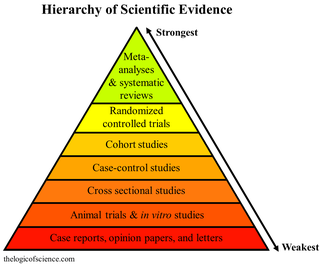
Analysis is the process of breaking a complex topic or substance into smaller parts in order to gain a better understanding of it. The technique has been applied in the study of mathematics and logic since before Aristotle, though analysis as a formal concept is a relatively recent development.

Research is "creative and systematic work undertaken to increase the stock of knowledge". It involves the collection, organization, and analysis of evidence to increase understanding of a topic, characterized by a particular attentiveness to controlling sources of bias and error. These activities are characterized by accounting and controlling for biases. A research project may be an expansion of past work in the field. To test the validity of instruments, procedures, or experiments, research may replicate elements of prior projects or the project as a whole.
In common usage, evaluation is a systematic determination and assessment of a subject's merit, worth and significance, using criteria governed by a set of standards. It can assist an organization, program, design, project or any other intervention or initiative to assess any aim, realizable concept/proposal, or any alternative, to help in decision-making; or to generate the degree of achievement or value in regard to the aim and objectives and results of any such action that has been completed.
Public policy is an institutionalized proposal or a decided set of elements like laws, regulations, guidelines, and actions to solve or address relevant and real-world problems, guided by a conception and often implemented by programs. These policies govern and include various aspects of life such as education, health care, employment, finance, economics, transportation, and all over elements of society. The implementation of public policy is known as public administration. Public policy can be considered to be the sum of a government's direct and indirect activities and has been conceptualized in a variety of ways.
Marketing research is the systematic gathering, recording, and analysis of qualitative and quantitative data about issues relating to marketing products and services. The goal is to identify and assess how changing elements of the marketing mix impacts customer behavior.
A case study is an in-depth, detailed examination of a particular case within a real-world context. For example, case studies in medicine may focus on an individual patient or ailment; case studies in business might cover a particular firm's strategy or a broader market; similarly, case studies in politics can range from a narrow happening over time like the operations of a specific political campaign, to an enormous undertaking like world war, or more often the policy analysis of real-world problems affecting multiple stakeholders.

Qualitative research is a type of research that aims to gather and analyse non-numerical (descriptive) data in order to gain an understanding of individuals' social reality, including understanding their attitudes, beliefs, and motivation. This type of research typically involves in-depth interviews, focus groups, or observations in order to collect data that is rich in detail and context. Qualitative research is often used to explore complex phenomena or to gain insight into people's experiences and perspectives on a particular topic. It is particularly useful when researchers want to understand the meaning that people attach to their experiences or when they want to uncover the underlying reasons for people's behavior. Qualitative methods include ethnography, grounded theory, discourse analysis, and interpretative phenomenological analysis. Qualitative research methods have been used in sociology, anthropology, political science, psychology, communication studies, social work, folklore, educational research, information science and software engineering research.

Social research is research conducted by social scientists following a systematic plan. Social research methodologies can be classified as quantitative and qualitative.

Quantitative research is a research strategy that focuses on quantifying the collection and analysis of data. It is formed from a deductive approach where emphasis is placed on the testing of theory, shaped by empiricist and positivist philosophies.
A conceptual framework is an analytical tool with several variations and contexts. It can be applied in different categories of work where an overall picture is needed. It is used to make conceptual distinctions and organize ideas. Strong conceptual frameworks capture something real and do this in a way that is easy to remember and apply.

In its most common sense, methodology is the study of research methods. However, the term can also refer to the methods themselves or to the philosophical discussion of associated background assumptions. A method is a structured procedure for bringing about a certain goal, like acquiring knowledge or verifying knowledge claims. This normally involves various steps, like choosing a sample, collecting data from this sample, and interpreting the data. The study of methods concerns a detailed description and analysis of these processes. It includes evaluative aspects by comparing different methods. This way, it is assessed what advantages and disadvantages they have and for what research goals they may be used. These descriptions and evaluations depend on philosophical background assumptions. Examples are how to conceptualize the studied phenomena and what constitutes evidence for or against them. When understood in the widest sense, methodology also includes the discussion of these more abstract issues.
Policy analysis or public policy analysis is a technique used in the public administration sub-field of political science to enable civil servants, nonprofit organizations, and others to examine and evaluate the available options to implement the goals of laws and elected officials. People who regularly use policy analysis skills and techniques on the job, particularly those who use it as a major part of their job duties are generally known by the title policy analyst. The process is also used in the administration of large organizations with complex policies. It has been defined as the process of "determining which of various policies will achieve a given set of goals in light of the relations between the policies and the goals."
The behavioural sciences explore the cognitive processes within organisms and the behavioural interactions between organisms in the natural world. It involves the systematic analysis and investigation of human and animal behaviour through naturalistic observation, controlled scientific experimentation and mathematical modeling. It attempts to accomplish legitimate, objective conclusions through rigorous formulations and observation. Examples of behavioural sciences include psychology, psychobiology, criminology, anthropology, sociology, economics, and cognitive science. Generally, behavioural science primarily seeks to generalise about human behaviour as it relates to society and its impact on society as a whole.
Evidence-based policy is a concept in public policy that advocates for policy decisions to be grounded on, or influenced by, rigorously established objective evidence. This concept presents a stark contrast to policymaking predicated on ideology, 'common sense,' anecdotes, or personal intuitions. The methodology employed in evidence-based policy often includes comprehensive research methods such as randomized controlled trials (RCT). Good data, analytical skills, and political support to the use of scientific information are typically seen as the crucial elements of an evidence-based approach.

A systematic review is a scholarly synthesis of the evidence on a clearly presented topic using critical methods to identify, define and assess research on the topic. A systematic review extracts and interprets data from published studies on the topic, then analyzes, describes, critically appraises and summarizes interpretations into a refined evidence-based conclusion. For example, a systematic review of randomized controlled trials is a way of summarizing and implementing evidence-based medicine.
The Millennium Research Program of the Canada Millennium Scholarship Foundation was launched in 2001 to assist the Foundation in carrying out its mandate to improve access to post-secondary education in Canada and provide students with the educational opportunities they need to prepare themselves for the future. The Research Program advances the study of barriers to post-secondary education and the impact of policies and programs designed to alleviate them. It ensures that policy-making and public discussion about opportunities in higher education in Canada can be informed by rigorous analysis and empirical evidence.

The Luxembourg Institute of Socio-Economic Research (LISER) is a research centre located in Esch-sur-Alzette, Luxembourg.
Science of science policy (SoSP) is an emerging interdisciplinary research area that seeks to develop theoretical and empirical models of the scientific enterprise. This scientific basis can be used to help government, and society in general, make better R&D management decisions by establishing a scientifically rigorous, quantitative basis from which policy makers and researchers may assess the impacts of the nation's scientific and engineering enterprise, improve their understanding of its dynamics, and assess the likely outcomes. Examples of research in the science of science policy include models to understand the production of science, qualitative, quantitative and computational methods to estimate the impact of science, and processes for choosing from alternative science portfolios.
Thematic analysis is one of the most common forms of analysis within qualitative research. It emphasizes identifying, analysing and interpreting patterns of meaning within qualitative data. Thematic analysis is often understood as a method or technique in contrast to most other qualitative analytic approaches – such as grounded theory, discourse analysis, narrative analysis and interpretative phenomenological analysis – which can be described as methodologies or theoretically informed frameworks for research. Thematic analysis is best thought of as an umbrella term for a variety of different approaches, rather than a singular method. Different versions of thematic analysis are underpinned by different philosophical and conceptual assumptions and are divergent in terms of procedure. Leading thematic analysis proponents, psychologists Virginia Braun and Victoria Clarke distinguish between three main types of thematic analysis: coding reliability approaches, code book approaches and reflexive approaches. They describe their own widely used approach first outlined in 2006 in the journal Qualitative Research in Psychology as reflexive thematic analysis. Their 2006 paper has over 120,000 Google Scholar citations and according to Google Scholar is the most cited academic paper published in 2006. The popularity of this paper exemplifies the growing interest in thematic analysis as a distinct method.
Necessary condition analysis (NCA) is a research approach and tool employed to discern "necessary conditions" within datasets. These indispensable conditions stand as pivotal determinants of particular outcomes, wherein the absence of such conditions ensures the absence of the intended result. For example, the admission of a student into a Ph.D. program necessitates a prior degree; the progression of AIDS necessitates the presence of HIV; and organizational change necessitates communication.



